Arbitration: Claim against former employee subject to arbitration clause in employment contract
Arbitration – Incomplete recording of FINRA Arbitration Hearing Does Not Vacate Award
Arbitration – Award vacated due to misapplied State Law
Arbitration – Right To Arbitration Not Waived by Delayed Filing
Arbitration – Health care proxy
Arbitration – Privilege
Arbitration – Legal malpractice – Maine law
Civil practice – Rule 11 – Sanctions
Tort – Wrongful death – Boating accident
Labor – Funding – Support – Arbitration award
Arbitration – Franchise agreement – Wage Act – Preemption
MBTA appealing $25 million arbitration award
Douglas G. Bailey vs. Astra Tech, Inc., & others
Arbitration – Time limit – Medical documents
Mediation: Employment – Settlement – Discrimination – Disability
Civil practice – Settlement – ‘Second thoughts’
Banks and banking – Settlement – Non-party – Safe deposit box
Chess match nets $12.25M in construction defect suit
Attorneys – Fees – Settlement
*
Arbitration: Claim against former employee subject to arbitration clause in employment contract
A plaintiff corporation charged that their former CEO and a company he started improperly used their company’s confidential information to lure an important client away from their firm. The Court ruled that plaintiff’s claims were subject to an arbitration clause in the defendant’s employment agreement.
The Court ruled that the defendant has met his burden … to show the existence of a valid and binding agreement to arbitrate at least some claims. … Thus, the question before the Court is which, if any, of [plaintiff] MOCA’s claims are encompassed by the Arbitration Clause in the Employment Agreement.
The defendant claimed that every claim alleged against him falls under the Employment Agreement’s Arbitration Clause encompassing ‘any and all claims or disputes arising out of this letter and any and all claims arising from or relating to your employment with the Company.’ The Court found that the claim for breach of the duty of loyalty falls within the reach of this Arbitration Clause. The clause provides that both the Company and the employee ‘agree to waive any rights to a trial before a judge or jury.’ … The illustrative list of claims within the scope of the clause includes claims such as breach of contract, defamation, invasion of privacy, fraud and others that do not depend, by definition, on an employment relationship.
The Court rejected the plaintiff’s argument that its claims arise out of Bernier’s conduct after MOCA terminated his employment (or in some instances conduct before and after) and, therefore, the claims do not arise from or relate to Bernier’s employment, finding it merely raises the question of whether, in light of the all the allegations, the claim ‘arises from or relates to’ Bernier’s employment with MOCA. .
The Court found plaintiff’s counts of common law misappropriation of confidential and other information, intentional interference with prospective business relations, conversion, violation of the Computer Fraud and Abuse Act claim, and commercial disparagement ‘arise from or relate to’ his employment with the Company, unless any of its remaining arguments undermine this conclusion. The Court further found that the Arbitration Clause encompasses this breach of contract claim and the strong federal and state policy favoring arbitration thus requires that the Court remand this claim to arbitration. …
MOCA Systems, Inc. v. Bernier, et al. (11 pages) (Sorokin, U.S.M.J.) (Civil Action No. 13-10738-LTS) (Feb. 18, 2014).
Arbitration – Incomplete recording of FINRA Arbitration Hearing Does Not Vacate Award
The plaintiffs asserted that the following issues in the arbitration require vacating the award: (1) communication between the defendants and the case administrator concerning obtaining recordings, and notifying the case administrator that the recording was incomplete; (2) failure to inform the plaintiffs about the missing recording prior to August 4, 2011; and (3) the lack of a recording for a ‘significant portion of the December 2nd morning session.’ The plaintiffs argue these issues support vacating the award due to either evident partiality or significant procedural irregularity. The Court disagree.
“… The plaintiffs assert there is evidence of ex parte communication, and that the evidence, combined with the failure to timely disclose the missing recording, demonstrates evident partiality or bias on the part of the arbitrators. However, there is no evidence of ex parte communication. The communication with the case administrator concerning hearing recordings was not an ex parte communication because it was not directed to an arbitrator in the case, as noted in rule 12210 of the Financial Industry Regulatory Authority’s (FINRA) code of arbitration procedure for customer disputes (code). The failure to inform the plaintiffs about the missing recording until August 4, 2011, which was also the day one arbitrator signed the award, does not establish that any of the arbitrators was partial to one party over another. As the Superior Court judge explained, the plaintiffs have not demonstrated any prejudice from the failure to inform them of the missing recording until August 4, 2011.
“Furthermore, failure to record one session of a fourteen-session arbitration is not a significant procedural irregularity that would require vacating the award. … Additionally, the late notification to the plaintiffs that the recording was missing, although unfortunate, did not create a significant procedural irregularity. These issues did not affect the evidence presented to the arbitrators or the plaintiffs’ ability to prepare their case.”
Abdelnour, et al. v. Merrill Lynch & Company, Inc., et al.(Appeals Court – Unpublished) (No. 12-P-1375) (Feb. 13, 2014).
Arbitration – Award vacated due to misapplied State Law
An arbitration panel awarded a respondent $600,000 in back pay and $36,042.03 in counsel fees and costs. The Court vacated the award because the panel misapplied state law.
“Respondent worked as an independent broker-dealer for petitioner, a securities firm headquartered in St. Petersburg, Florida. In May 2009, petitioner discovered that respondent was abusing alcohol. Given its location, petitioner concluded that it could not adequately supervise respondent, who ran his own branch in Vermont. It terminated respondent on July 1, 2009. On February 15, 2012, respondent filed an arbitration proceeding alleging petitioner retaliated against him because of his sexual orientation and his disability as an alcoholic, in violation of the Vermont Fair Employment Practices Act, 21 V.S.A. §495. … Applying a choice of law clause in the contract the parties signed, … the panel determined that Florida law governed the proceeding. … In its final dispute resolution document, the panel stated that it considered the pleadings, evidence, and testimony in issuing the award, but it provided no legal analysis or explanation of its reasoning. …
“Respondent’s claim alleged a violation of a Vermont statute. In his post-hearing brief, he moved to add discrimination and retaliation claims under Florida law, … but the panel denied the motion. … Yet the arbitrators then concluded that Florida law governed the case. … Under Florida law, respondent’s claim, brought some two and one-half years after the termination of the contract, was barred by Florida’s one-year statute of limitations. Fla. Stat. Ann. §760.11. Nonetheless, the arbitrators ignored that statute and somehow construed Florida law to find a violation of a Vermont statute — a statute which, given the governing law, was wholly inapplicable to the case. Awarding damages to a plaintiff who has pled no claims under the applicable law plainly transgressed the limits of the arbitrators’ power. For this reason, the award must be vacated.”
Raymond James Financial Services, Inc. v. Fenyk (3 pages) (Zobel, J.) (USDC) (Civil No. 13-11326-RWZ) (Feb. 6, 2014).
Arbitration – Right To Arbitration Not Waived by Delayed Filing
The plaintiff alleges that the defendant wrongfully attempted to collect alleged credit card debts from him and other Massachusetts residents by suing them in Massachusetts state courts, and the Court found the matter must be referred to arbitration based on the plaintiff’s credit card agreement.
“Defendants CACH [LLC] and [J.A.] Cambece [Law Offices] have moved to compel arbitration and to stay or dismiss the litigation. … Plaintiff, in turn, asserts that defendants waived their right to arbitrate by filing the collection actions in state court and because he suffered prejudice by their delay in seeking arbitration. …“Here, plaintiff contends that defendants explicitly waived their right to arbitration by filing two certifications in the state court actions. … However, the certifications merely state that the attorneys discussed dispute-resolution services with their clients in accordance with the rules of the Supreme Judicial Court. They do not constitute a waiver of any rights.
“As for implied waiver, defendants’ delay in seeking arbitration was minimal. Plaintiff filed his complaint in state court on September 26, 2013. After removing the matter to federal court, CACH and Campece moved to compel arbitration on November 11 and December 12, 2013, respectively. A delay of less than one-and-a-half or two-and-a-half months is hardly excessive. … Furthermore, no discovery and little litigation had occurred within that period. Plaintiff, therefore, appears to have suffered little, if any, prejudice.
“CACH’s decision not to invoke arbitration in the earlier state-court collection actions is not relevant. The contract here provides that either party can elect arbitration as to ‘any claim.’ … It does not require that the parties either litigate all claims or arbitrate all claims. The collection actions, which CACH brought against plaintiff, are distinct from the claims brought by plaintiff here. CACH did not, therefore, waive its right to arbitrate the present dispute. …
“Because plaintiff suffered neither delay nor prejudice, the Court finds that defendants did not waive their right to invoke the arbitration clause. Accordingly, the motions to compel arbitration will be granted. …
Schwartz v. CACH, LLC, et al. (7 pages) (Saylor, J.) (USDC) (Civil Action No. 13-12644-FDS) (Jan. 27, 2014).
Arbitration – Health care proxy
By: Tom Egan, January 14, 2014
Where (1) a plaintiff commenced a wrongful death action as the administrator of the estate of his deceased mother and (2) the defendant nursing home operator moved to compel arbitration based on an arbitration agreement that the plaintiff signed purportedly on his mother’s behalf, the motion to compel was correctly denied because the plaintiff lacked authority to execute an arbitration agreement on his mother’s behalf and the arbitration agreement does not otherwise bind her estate.
“Our decision in Johnson v. Kindred Healthcare, Inc., ante, (2014), disposes of [defendant] GGNSC’s claim by holding that ‘a health care agent’s decision to enter into an arbitration agreement is not a health care decision as that term is defined and used in the health care proxy statute.’ Nonetheless, because the question has been raised and the parties have fully briefed the issue whether a transfer report or similar medical record can activate a health care proxy, we address that question. …
“… The transfer report makes no reference to Rita [Licata]‘s capacity or incapacity to make or communicate health care decisions. … Nor does the record reflect that the author of the transfer report, Rita’s attending physician at the medical center, notified Rita and [plaintiff] Salvatore [Licata Jr.] of the physician’s medical determination that Rita lacked the capacity specifically to make health care decisions.
“Furthermore, treating a transfer report or similar medical record both as a determination of incapacity to make health care decisions and as notice to a principal and agent that a health care proxy is effectuated, would create uncertainty about when the proxy has been triggered and deprive a principal of the opportunity to object to its activation. … Thus, Rita’s health care proxy did not take effect until her attending physician at the nursing facility executed the ‘Documentation of Resident Incapacity Pursuant to Massachusetts Health Care Proxy Act [G.L.c.] 201D,’ almost three weeks after her admission to the facility. …
“GGNSC argues in the alternative that Salvatore was authorized to sign the arbitration agreement as Rita’s son and ‘responsible party’ under G.L.c. 201D, §16. This argument is unavailing. …
“… GGNSC cites no binding authority for the position that a responsible party authorized to give informed consent on behalf of an incompetent patient also may bind the patient to an arbitration agreement. In light of our decision in Johnson v. Kindred Healthcare, Inc., … that a health care agent’s authority to make health care decisions does not include the power to sign an arbitration agreement on the principal’s behalf, we do not adopt such a position. It would be unreasonable to recognize a wider scope of authority for a responsible party, not appointed by the principal, than exists for a health care agent, designated by the principal. Thus, even assuming that Salvatore qualified as a responsible party for purposes of giving informed consent to medical treatment, this role did not empower him to sign an arbitration agreement on Rita’s behalf. …
“… As courts in other jurisdictions have recognized, a purported agent’s own representations, absent authority from the principal to make such representations, cannot establish apparent authority to sign an arbitration agreement on a nursing home resident’s behalf. …
“GGNSC points to no conduct by Rita to support its claim that Salvatore had apparent authority to sign the arbitration agreement. …”
Licata v. GGNSC Malden Dexter LLC (Lawyers Weekly No. 10-010-14) (18 pages) (Duffly, J.) (SJC) Motion to dismiss and to compel arbitration was heard by Troy, J., in Superior Court. Joseph M. Desmond and Thomas T. Worboys, both of Morrison Mahoney, for the defendant; Michael R. Rezendes and Patricia J. Rezendes, both of Rezendes & Trezise, for the plaintiff; Kelly Bagby, of the District of Columbia, & Rebecca J. Benson, of Margolis & Bloom, and Debra Silberstein submitted a brief for National Academy of Elder Law Attorneys (Massachusetts Chapter) and another, amici curiae (Docket No. SJC-11336) (Jan. 13, 2014).
Arbitration agreement not binding under proxy.
*
A health care agent’s decision to enter into an arbitration agreement is not a “health care decision” under G.L.c. 201D, §5, and thus an agent’s agreement to arbitrate all claims arising out of a principal’s stay in a nursing facility does not bind the principal, the Supreme Judicial Court has ruled.
The suit involved Dalton Johnson, who executed a health care proxy authorizing his wife, Barbara Johnson, “as my Health Care Agent to make any and all health care decisions for me, except to the extent that I state otherwise.”
When a suit was brought on his behalf against a defendant a health care facility, the defendant moved to arbitrate.
The Supreme Judicial Court reversed a Superior Court’s decision to allow that motion.
“The language of G.L.c. 201D, §5, considered in the context of its purpose and the broader statutory framework, authorizes the agent only to make those decisions requiring a principal’s informed consent to a medical treatment, service, or procedure; it does not authorize a health care agent to make all decisions that the principal could have made if competent, even those that might bear some relationship to the receipt of medical services,” Justice Fernande R.V. Duffly wrote for a unanimous SJC.
“Were we to define ‘health care decisions’ broadly to encompass decisions that relate to a principal’s business affairs, property, finances, or the adjudication of legal claims, all of which fall within the authority of an attorney in fact or court-appointed guardian or conservator, many decisions made by the health care agent would override the more expansive powers allocated to these fiduciaries,” the court reasoned. “Such a reading would conflict with the language and intent of the health care proxy statute, which confers decision-making authority only over a narrowly-defined area (health care); it also would upset the statutory scheme that grants broader authority to attorneys in fact, guardians, and conservators.”
Johnson, et al. v. Kindred Healthcare, Inc., et al. (Lawyers Weekly No. 10-009-14)
Arbitration – Privilege
By: Tom Egan, January 10, 2014
Where the Boston School Committee refused to allow more than three of a union’s bargaining unit members to attend an arbitration, the school committee did not thereby violate G.L.c. 150E, §10(a)(5), or repudiate the past practices provision of the parties’ collective bargaining agreement.
However, statements by the school committee’s labor counsel — impliedly threatening unit members with adverse consequences if they did not leave an arbitration hearing — are not privileged.
“Here, the [Boston] Association [of School Administrators and Supervisors] has not established that there was a practice of permitting more than three school-based unit members to attend an arbitration simultaneously. … Six or more unit members leaving the schools to attend an arbitration is very different from unit members leaving the central administration office. As the parties stipulated, school-based unit members’ duties and responsibilities are very important to the running of the school. …. Accordingly, I dismiss this allegation. …
“… Because there was not a ‘fixed, established practice accepted and known’ by both the School Committee and Association, as explained above, the School Committee did not repudiate Article XI of the CBA by only permitting three unit members to attend the arbitration on December 9, 2008. This allegation is dismissed. …
“The Complaint alleges that [Virginia] Goscinak, as a School Committee agent, made statements before unit members which impliedly threatened those members with adverse consequences if they did not leave the hearing and return to their respective schools. The School Committee does not argue that Goscinak was not a School Committee agent, or that her statements would not chill a reasonable employee in the exercise of his or her rights. Rather, it contends that all of her statements were made on the record after the arbitration opened and, therefore, are absolutely privileged. …
“Even assuming without deciding that a party could invoke the absolute litigation privilege in connection with statements made at an arbitration in order to shield itself from a potential violation of the Law, the privilege does not apply to any statements made during the proceeding. Instead, ‘statements by a party, counsel, or witness in the institution of, or during the course of, a judicial proceeding are absolutely privileged provided such statements relate to that proceeding.’ (Emphasis Added.) …
“Goscinak’s statements that too many unit members were at the arbitration, and her subsequent actions in attempting to order the unit members back to their schools and contacting their principals to do so, did not relate to the proceeding at hand. Although Goscinak made these statements on the record of the arbitration, the actual issue to be heard was whether ‘personnel in schools designated as Superintendent’s Schools are working a lengthened workday without compensation’ in violation of the parties’ CBA, and had nothing to do with the number of unit members who could simultaneously attend an arbitration. Goscinak was not even attempting to limit the unit members who could testify in the case, but rather she was merely attempting to limit the number of unit members who could simultaneously wait to testify. … I therefore decline to extend the absolute litigation privilege to Goscinak’s statements that were unrelated to the subject matter of the arbitration. …
“… I have no doubt that Goscinak’s conduct in arguing that the unit members could not be at the arbitration, and subsequently contacting their principals to order them back to their schools, would chill a reasonable employee from engaging in their protected rights. It is highly likely that after such an incident, a reasonable employee would have concerns about attending an arbitration with multiple witnesses. Accordingly, I find that the School Committee violated Section 10(a)(1) of the Law by Goscinak’s statements at the arbitration on December 9, 2008.”
In the Matter of: Boston Association of School Administrators and Supervisors; and Boston School Committee (Lawyers Weekly No. 21-063-13) (23 pages) (Hatfield, Hearing Officer) (DLR) Peter J. Berry, of Deutsch Williams Brooks DeRensis & Holland, for the employer; Matthew E. Dwyer and Mark J. Esposito, both of Dwyer, Duddy & Esposito, for the union (Case No. MUP-08-5374) (Dec. 13, 2013).
Arbitration – Legal malpractice – Maine law
By: Tom Egan, December 20, 2013
Where a client sued his former counsel for malpractice and violations of Maine’s Unfair Trade Practices Act, a U.S. District Court judge did not err in enforcing an arbitration clause in the attorney-client engagement letter according to state law.
“ … We think it is clear that Maine law permits attorneys to enforce arbitration clauses like the one at issue here.
“[Plaintiff Douglas Bezio] argues his position is supported by the fact that under Maine law attorneys are fiduciaries. …
“The Maine Law Court has not addressed the precise claim Bezio makes. Nonetheless, we think the answer is clear based on Opinion 170 of the Law Court’s Professional Ethics Commission, the Law Court’s not having expressed disagreement with Opinion 170 over the almost fifteen years since it issued; the views of the ABA, on which the Law Court gives weight on ethics matters; and Maine’s strong policy of supporting arbitration agreements, embodied in the Maine Uniform Arbitration Act …
“… We do not think the Law Court would depart from a generally accepted practice such as this, particularly when this approach is also consistent with the purpose of the FAA. We have previously upheld arbitration of attorney malpractice claims under New York law. …
“That other jurisdictions may follow different interpretations of their professional liability rules is of no moment. …
“We also reject Bezio’s argument, whether or not preserved, that as a matter of generally applicable contract defenses, … Maine law would find this arbitration clause to be unconscionable and would not enforce it. Bezio is nowhere close to meeting the requirements of Maine law for unconscionability. … There is nothing inherently unconscionable about enforcing an arbitration clause encompassing malpractice claims between an attorney and a client. The clause is neither procedurally nor substantively unconscionable.”
Bezio v. Draeger, et al. (Lawyers Weekly No. 01-313-13) (14 pages) (Lynch, C.J.) (1st Circuit) Appealed from the U.S. District Court for the District of Maine (Docket No. 13-1910) (Dec. 16, 2013).
Civil practice – Rule 11 – Sanctions
By: Tom Egan, December 17, 2013
Where (1) plaintiffs brought suit alleging, among other claims, breach of contract, negligent misrepresentation and violation of Chapter 93A, (2) the defendant was granted judgment on the pleadings based on a prior U.S. District Court judgment confirming an arbitration award adverse to an entity affiliated with the plaintiffs and (3) the defendant now moves for Rule 11 sanctions, the plaintiffs’ counsel was not culpably careless in filing their complaint, so the motion for sanctions should be denied.
“Although Plaintiffs purported to bring their claim as parties separate and distinct from CCS Resources, this court held that ‘Plaintiffs’ allegations establish sufficient identicality between CCS Resources and Plaintiffs,’ and, therefore, allowed Defendant’s Motion for Judgment on the Pleadings [#12] pursuant to principles of claim preclusion. Because Federal Rule of Civil Procedure 11 required Plaintiffs’ counsel to make a reasonable inquiry into the existing law, which would have made plainly apparent that this claim was precluded, Defendant urges this court to sanction Plaintiffs’ counsel for failing to make such inquiry. After failing to convince this court that their claims did not warrant dismissal under well-established claim preclusion principles, Plaintiffs not only deny engaging in any conduct sanctionable under Rule 11, but additionally ask this court to reconsider its March 20, 2013 Order [#35]. …
“Defendant does not show that Plaintiffs were culpably careless in bringing this claim. Although Plaintiffs’ motions and memoranda are riddled with spelling and grammatical errors and Plaintiffs failed to employ proper legal citation, Plaintiffs did present legal arguments in support of their contention that their claims are not barred under judicial estoppel principles. The fact that Plaintiffs’ arguments ultimately proved unavailing, and were weak to begin with, does not warrant sanctions under Rule 11 without a showing of more serious misconduct. Additionally, considering that, at the time that they filed the Complaint [#1], Plaintiffs’ affiliate had already made full payment pursuant to the arbitration judgment rendered against it, it is not clear that Plaintiffs brought this claim for an improper purpose. Because Defendant fails to show that Plaintiffs’ claims rise to the ‘patently frivolous’ level, Defendant’s Motion for Sanctions is denied.”
Credit Control Services, Inc., et al. v. Noble Systems Corp. (Lawyers Weekly No. 02-710-13) (5 pages) (Tauro, J.) (USDC) (Civil Action No. 12-11321-JLT) (Dec. 12, 2013).
Tort – Wrongful death – Boating accident
By: Tom Egan, December 16, 2013
Where the parents of a recent high school graduate who died on a trip to Mexico have asserted a wrongful death claim against the defendant corporation that organized the trip, summary judgment is inappropriate given that discovery is not complete.
“Recent high school graduates Lisa Tam Chung and Loren Daily participated in a trip to Mexico organized by defendant StudentCity.com, Inc. (‘StudentCity’). A boating accident occurred during a snorkeling excursion. Lisa died; Loren barely escaped with her life. Lisa’s parents, Oahn Nguyen Chung and Liem Chung, Oahn Nguyen Chung as administratrix of Lisa’s estate, Loren Daily, and Loren’s parents, Patricia and Ollie Daily, filed several claims against defendant. The customer agreement Lisa and Loren signed contains a mandatory arbitration clause, Docket # 1-3 §XXIV, and in two prior orders (Docket ## 26, 42), I dismissed in favor of arbitration all claims save for the wrongful death claims brought by Lisa’s parents. See Mass. Gen. L. ch. 229 §2. Now before me is defendant’s motion to dismiss, Fed. R. Civ. P. 12(b)(6), or in the alternative, for summary judgment on, … these remaining claims. …
“Plaintiffs contend that defendant negligently selected Servicios Maritimos, a Mexican boat company, to lead the snorkeling excursion. … At this stage in the litigation, and giving plaintiffs the benefit of all reasonable inferences, I cannot conclude that plaintiffs’ claims for relief are so wholly implausible as to permit their resolution on a motion to dismiss. Defendant’s Rule 12(b)(6) motion is therefore denied. …
“Defendant moves in the alternative for summary judgment. Plaintiffs oppose on the merits and because they have not had adequate opportunity to conduct discovery. They identify numerous facts that require additional development, including oral and written representations defendant made to Lisa, Loren, and their parents, a recommendation regarding Servicios Maritimos that defendant sought and received from a tourism official in the Mexican government, and the presence of defendant’s staff members on the trip. …
“Discovery has not yet begun in this matter. Defendant has not answered the complaint and the parties have not had a discovery scheduling conference. … Much of the factual information plaintiffs desire is in defendant’s control and can be turned over expeditiously. That information may affect the determination of whether defendant voluntarily undertook a duty to ensure the safety of trip participants, and whether defendant knew or should have known about Servicios Maritimos’s dubious prior safety record, if indeed it exists. Because these facts pertain to the essential elements of a negligence claim, … they bear directly on the outcome of the summary judgment motion. Rule 56(d) relief is appropriate in these circumstances.”
Chung, et al. v. StudentCity.com, Inc. (Lawyers Weekly No. 02-706-13) (4 pages) (Zobel, J.) (USDC) (Civil Action No. 10-10943-RWZ) (Dec. 12, 2013).
Labor – Funding – Support – Arbitration award
By: Tom Egan, December 6, 2013
Where a union has charged the Chelsea City Manager with failing to voice support for funding for the cost times in an arbitration award, the union is entitled to summary judgment only as to a March 18 meeting of the City Council.
Partial victory
“Chapter 1078 of the Acts of 1973, as amended, requires the employer and the exclusive representative to support [Joint Labor Management Committee (JLMC)] arbitration awards in the same way and to the same extent that the employer and the exclusive representative are required to support any other decision or determination that they agree to pursuant to Chapter 150E. … For example, an employer violated the Law by failing to speak before the legislative body in opposition to a motion to decrease the amount of an appropriation that would be necessary to fund a collective bargaining agreement. Turner Falls Fire District, 4 MLC 1658 (1977).
“The Union argues that the City violated its obligation to unconditionally support the Award because the only supportive step that [Jay] Ash took was his February 25 statement that his support was required and consistent with State law. The Union contends that this statement falls short of expressing actual support for the Award and unlawfully pales in comparison to the enthusiasm that Ash displayed for the newly-negotiated Police Superior Officers’ contract. Ash’s statements to the City Councilors before and after the Award issued reminding them that they could vote against it signaled his true non-support, the Union maintains, and Ash had an affirmative obligation to verbalize his support for the Award once the City Council proposed a Resolution designed to subvert it. Ash violated the Law by remaining silent at the March 18 meeting. This case is not moot merely because the City Council voted to fund the Award, the Union contends, because the possibility exists that such conduct will recur in the future. …
“Although the funding dispute ceased with the City Council’s vote to fund the Award, the funding vote was separate from the City’s Manager’s conduct at issue in the Complaint, and the City Manager took no steps to remedy his own unlawful conduct. … Further, although the wrong that occurred in 2013 cannot recur during the pendency of the current contract, it could recur in future negotiations, as Ash never acknowledged any wrongdoing. …
“The Complaint alleges that Ash’s statement — ‘[p]er State law, once a decision is reached, I am required to provide you with the filing necessary to fund the award. This communication and my support of the Award are required and therefore consistent with State law’ — does not provide the requisite unconditional support for the funding request. The Union argues that this language expresses feigned rather than actual support, and that other communications from Ash to the City Council signaled a contrary position. I disagree and conclude that Ash’s February 25 expression of support satisfies the City’s bargaining obligation under the Law.
“The City can use different words to express support for different awards or negotiated agreements and need not mirror its enthusiasm for the police contract in its support for the firefighters’ Award. … Distilled to its essence, Ash’s statement communicated that his support was consistent with State law. Though tepid in tone, Ash’s position was clear enough for Hatleberg to understand that Ash supported the Award. Ash’s February 7 email to the City Councilors advising them of their ability to ‘approve, disapprove or request changes’ signaled no wrongful intent because it applied equally to both the police contract and the firefighters’ Award. …
“I reach a contrary conclusion regarding Ash’s silence at the March 18 meeting. … As the CERB explained in Worcester School Committee, 5 MLC 1080, 1083-1085 (1978), the obligation to seek funding is not static; it requires more than token efforts, and it compels employers to take affirmative steps — indeed, all steps necessary — to obtain funding to implement the cost items of an agreement.
“The City correctly notes that the City Manager took the affirmative step of submitting the Award to the City Council for funding. However, this action did not complete its obligation to bargain in good faith, because after Ash submitted the Award, the City Council took up a Resolution to renegotiate rather than fund the Award. Hatleberg’s prediction that the Resolution vote would be a proxy for a vote on the Award made clear that funding for the Award was at stake. The vote to renegotiate a contract on terms more favorable to the City left no doubt that a vote for the Resolution was a vote against the Award. Here as in Worcester School Committee, supra, the City’s support obligations changed when intervening events reduced the likelihood that the Award would be funded and required the City to modify its approach and step up its efforts. Therefore, the City’s bargaining obligation did not cease with Ash’s February 25 statement, but required him to vocalize his support for the Award at the March 18 meeting.
“Further, the fact that Hatleberg knew that Ash had supported the Award and acknowledged Ash’s support in his remarks was not enough to satisfy the City’s bargaining obligation. Ash sat silently by while Hatleberg tried to persuade his fellow Council members to reject the Award, and in these circumstances, his prior communication of support was no more than a token effort to obtain funding. The Law required Ash to take steps all steps necessary to obtain funding, which required speaking up to encourage the City Council to support the Award rather than the Resolution. …
“I need not assess whether Ash was obligated to imperil his employment in an effort to persuade the Council to fund the Award. Town of Rockland [16 MLC 1001 (1989)] requires vocalized support irrespective of the relational differences between the participants in the two cases. Here as in Rockland, the funding body could have misconstrued Ash’s silence as support for the Resolution, which as noted above, contravened the Award. The only way that Ash could clarify his support for the Award at a time when the Council was entertaining an alternative was to voice it. His silence at that critical time placed his support in doubt. …
“For the reasons stated above, I allow the Union’s Motion for Summary Judgment regarding Ash’s conduct at the March 18, 2013 meeting, and deny the remainder of its Motion. I also allow the City’s Motion for Summary Judgment regarding Ash’s February 25, 2013 statement and deny the remainder of its motion.”
In the Matter of: City of Chelsea and Chelsea Firefighters, Local 937, IAFF (Lawyers Weekly No. 21-061-13) (18 pages) (Atwater, Hearing Officer) (DLR) Jaime Kenny, of Clifford & Kenny, for the city; Alfred Gordon O’Connell for the union (Case No. MUP-13-2683) (Nov. 6, 2013).
Arbitration – Franchise agreement – Wage Act – Preemption
By: Tom Egan, December 6, 2013
Where plaintiffs have moved for reconsideration of an order regarding the arbitrability of Massachusetts Wage Act claims, the court concludes (1) that only express statements can submit Wage Act claims to arbitration but (2) that under 1st U.S. Circuit precedent, such a requirement would be preempted by the Federal Arbitration Act.
“Shortly before entering final judgment, this Court ruled that some franchisees who bought their franchises through consent-to-transfer agreements were not provided with proper notice of the arbitration clause in the franchise agreements. … Because of that lack of notice, this Court ruled that those franchisees were not bound by the arbitration clause, and were thus part of the certified class. …
“On December 27, 2012, the First Circuit reversed that decision. Awuah v. Coverall N. Am., Inc. (Awuah II), 703 F.3d 36 (1st Cir. 2012). It held that ‘Massachusetts law, which governs this dispute, does not impose any such special notice requirement upon these commercial contractual provisions. Such a requirement, in any event, would be preempted by the Federal Arbitration Act (‘FAA’), 9 U.S.C. §1, et seq. …’ …
“Complicating matters, ten days earlier the Massachusetts Supreme Judicial Court (the ‘Supreme Judicial Court’) had held in Crocker v. Townsend Oil Co., 464 Mass. 1 (2012), that waiver of claims under the Wage Act, Mass. Gen. Laws ch. 149, §§148, 150, must be done in ‘clear and unmistakable terms. … [The waiver] must specifically refer to the rights and claims under the Wage Act.’ …
“As a result of these two decisions, the Plaintiffs filed two motions for reconsideration. …
“In essence, the Plaintiffs argue for a special notice requirement before wage claims may be subjected to arbitration agreements. …
“… The issue for this Court to resolve is whether, under Massachusetts law, an agreement by an employee that includes a general provision to arbitrate all disputes or claims ‘will be enforceable as to the statutorily provided rights and remedies conferred by the Wage Act only if such an agreement is stated in clear and unmistakable terms.’ …
“… This Court concludes that, under Massachusetts law, to subject a Wage Act claim to arbitration, an agreement must do so explicitly. This conclusion is based on the Court’s reading of Crocker, 464 Mass. 1, and Crocker’s reliance on Warfield v. Beth Israel Deaconess Medical Ctr., Inc., 454 Mass. 390, 398-400 (2009), abrogated by Joulé, Inc. v. Simmons, 459 Mass. 88, 96 n.9 (2011) (concluding that even where an employee has agreed to arbitrate employment discrimination claims, the employee may still file a complaint with the Massachusetts Commission Against Discrimination). … Given the similar treatment of Wage Act claims and statutory employment discrimination claims and releases of claims and submissions of claims to arbitration by the Supreme Judicial Court, this Court must conclude that under Massachusetts law, only express statements can submit Wage Act claims to arbitration. …
“The FAA states that arbitration agreements ‘shall be valid, irrevocable, and enforceable, save upon such grounds as exist at law or in equity for the revocation of any contract.’ 9 U.S.C. §2. If given a fresh slate free from binding precedent, this Court would conclude that this section of the FAA does not preempt Massachusetts law requiring express notice to submit Wage Act claims to arbitration.
“This Court, however, does not have such a blank slate on which to write. Instead, it must recognize binding precedent by the Supreme Court and, relevant to this case, the First Circuit. …
“… In this case, the First Circuit has spoken on this very issue. It has stated that a special notice requirement ‘would be preempted by the [FAA], which requires courts to place such arbitral agreements upon the same footing as other contracts.’ … This Court disagrees with that conclusion because a special notice requirement to arbitrate Wage Act claims would not be placing arbitral agreements on a different footing from other contracts; after all, waiving Wage Act claims also requires express notice. …. This Court, however, had to reject this motion for reconsideration because the First Circuit clearly stated that such a special notice requirement for arbitration would be preempted by the FAA. The plaintiffs must convince the First Circuit that the FAA does not preempt such a rule under Massachusetts law to prevail on their motion.”
Awuah, et al. v. Coverall North America, Inc. (Lawyers Weekly No. 02-684-13) (10 pages) (Young, J.) (USDC) (Civil Action No. 07-10287-WGY) (Dec. 5, 2013).
MBTA appealing $25 million arbitration award
By: Noah Schaffer, December 4, 2013
Despite fare hikes and a financial bailout last year and an influx of new taxes set into law this summer, the MBTA is on course for another multi-million-dollar deficit this fiscal year, which a top T official blamed on an arbitration award for an employees’ union.
“The projection does show us to have a deficit at the end of the year of approximately $25 million,” MBTA Chief Financial Officer Jonathan Davis told the Massachusetts Department of Transportation Finance and Audit Committee last week. “All of that relates to the arbitration award to Local 589. Now we are appealing that so it’s yet to be determined as to what that full impact would be.”
Under the award, the union that represents bus drivers, subway operators, maintenance workers and others would receive a 10.4 percent salary increase and retroactive raises dating back to 2010 of between $10,000 to almost $14,000 per worker, MBTA spokesman Joe Pesaturo told State House News Service.
The T’s appeal, which questions whether the arbitrator considered the authority’s ability to meet costs, is scheduled to be heard in Suffolk Superior Court on Dec. 16.
The 110-page award was issued in August by Sarah Kerr Garraty. The last contract expired in 2010. An official at Local 589 did not respond to phone messages seeking comment.
The arbitration noted Local 589 represents 3,481 employees “spread over 37 job classifications.”
“Secretary of Transportation Richard Davey and MBTA General Manager Beverly Scott stress that this lawsuit is not about the employees, and they acknowledge the good work they do every day,” Pesaturo said.
Douglas G. Bailey vs. Astra Tech, Inc., & others
DOUGLAS G. BAILEY[1] vs. ASTRA TECH, INC., & others[2]; ROBERT G. STOCKARD,[3] & others,[4] third-party defendants.
Suffolk. October 10, 2012. ‑ December 4, 2013.
Present: Kafker, Cohen, & Trainor, JJ.
Agency, Agent’s contract, Scope of authority or employment. Contract, Settlement agreement, Construction of contract, Contract clause, Merger. Escrow.
Civil action commenced in the Superior Court Department on January 13, 2009.
A motion for approval of a settlement agreement was heard by Judith Fabricant, J., and entry of a separate and final judgment was ordered by her.
Steven M. Cowley for the plaintiff.
Harvey E. Bines for CID Equity Capital VIII, LP, & others.
Richard D. Batchelder, Jr., for Astra Tech, Inc.
TRAINOR, J. Douglas G. Bailey, as shareholders’ agent (shareholders’ agent) of the shareholders of Atlantis Components, Inc. (Atlantis), appeals from a judgment of the Superior Court that (1) approved the settlement between Astra Tech, Inc. (Astra Tech), and a group of former shareholders of Atlantis (settling shareholders), and (2) ordered distribution of the settling shareholders’ proportional share of an escrow fund. The only issue before us is whether the settling shareholders had the power to negotiate this settlement with Astra Tech. Claiming that they do not have this authority, the shareholders’ agent makes three arguments: first, that there is no procedural mechanism that allows the settling shareholders to settle with Astra Tech; second, that under the merger agreement, he has the exclusive right to negotiate with Astra Tech; and third, that his agency is irrevocable because he has a power coupled with an interest. We reject these arguments and affirm the judgment of the Superior Court.
Background. In October of 2007, Astra Tech acquired Atlantis by a stock purchase merger for $71 million.[5] As is common, the parties placed a portion ($6.3 million) of the purchase price into an escrow fund, which would be disbursed to the former Atlantis shareholders on a pro rata basis on December 31, 2008, the release date. The escrow fund’s purpose was to indemnify Astra Tech if it paid any claims asserted against Atlantis after the closing date but before the release date. The merger agreement designated a shareholders’ agent to serve as the representative of the former Atlantis shareholders.[6] It was the shareholders’ agent’s duty either to approve Astra Tech’s indemnification claim on the escrow fund or to challenge it. The merger agreement also created a $100,000 representative’s fund, from which the shareholders’ agent would be reimbursed for fees, expenses, and costs incurred while performing his duties as shareholders’ agent.
In a letter to Atlantis dated August 23, 2007 (about one month before execution of the merger agreement), Atlantis’s competitor, Nobel Biocare USA, LLC (Nobel), alleged that Atlantis was infringing on Nobel’s patents.[7] In a letter dated six days later, Atlantis denied Nobel’s allegations, and on September 6, 2007, Astra Tech was informed of the Nobel claim. In a letter to Atlantis dated September 12, 2007, Nobel reiterated its patent infringement claim and attempted to refute Atlantis’s defenses. Robert G. Stockard, Atlantis’s chief executive officer, never disclosed this second letter, and Astra Tech did not learn of it until October 19, 2007. Alleging fraudulent and intentional misrepresentation against Atlantis for failing to disclose the September 12 letter, Astra Tech made an indemnification claim on the escrow fund for $417,992.33.[8],[9] After an initial rebuff by the shareholders’ agent, Astra Tech provided a formal demand for payment in a letter dated December 30, 2008, one day before the release date of the escrow fund. Because Astra Tech did not yet know the cost of defending the Nobel claim, Astra Tech demanded payment of the entire $6.3 million in the escrow fund. Stockard, the then-shareholders’ agent, submitted a notice of contention to Astra Tech’s claim, and subsequently filed suit against Astra Tech seeking a declaration that no indemnification was due Astra Tech from the escrow fund. Astra Tech counterclaimed — and brought in numerous third-party defendants, including the settling shareholders — seeking a declaratory judgment that it was entitled to the funds. Also, alleging fraud, breach of contract, and violation of G. L. c. 93A, Astra Tech sought damages, not limited to the former Atlantis shareholders’ proportional share of the escrow funds, directly from the third-party defendants.
As the lawsuit progressed and discovery ensued, Astra Tech’s legal expenses, which were compensable from the escrow fund, ballooned to nearly $2.5 million by October of 2010. Faced with potentially high out-of-pocket damages and a rapidly dwindling escrow fund, the settling shareholders opted to settle directly with Astra Tech, using their pro rata share of the escrow fund as payment. After reaching an agreement, the settling shareholders and Astra Tech moved in Superior Court for approval of their settlement. The shareholders’ agent opposed the settlement, on the basis that neither the merger agreement nor the escrow agreement permitted the settling shareholders to seek disbursement absent the consent of the shareholders’ agent. A judge approved the settlement agreement between Astra Tech and the settling shareholders.
The final settlement agreement, as approved by the judge, required that $2,453,850, i.e., 38.95 percent (the settling shareholders’ proportional interest in the escrow fund) be released from the escrow fund. Astra Tech would then release its claims against the settling shareholders for $973,305.18[10] of the released funds. In return, the settling shareholders would receive the remaining $1,480,544.82, to be distributed according to each settling shareholder’s pro rata share. The judge then ordered judgment pursuant to Mass.R.Civ.P. 54(b), 365 Mass. 820 (1974), and dismissed the third-party claims against the settling shareholders. The shareholders’ agent appeals.
Discussion. The facts here are not in dispute, and the issues generally will be determined by our interpretation of the terms of several agreements. “Because the interpretation of the terms of a contract or agreement is a pure question of law, we exercise de novo review over this issue.” Buchanan v. Contributory Retirement Appeal Bd., 65 Mass. App. Ct. 244, 247 n.5 (2005).
Resolution of this case requires the interpretation and interplay of three contracts between the parties: (1) the escrow agreement between Astra Tech, Atlantis, the shareholders’ agent, and the escrow agent; (2) the merger agreement between Astra Tech, Atlantis, and the shareholders’ agent; and (3) the settlement agreement between Astra Tech and the settling shareholders. In interpreting these agreements, we are guided by the familiar tenets of contract interpretation. “The object of the court is to construe the contract as a whole, in a reasonable and practical way, consistent with its language, background, and purpose.” USM Corp. v. Arthur D. Little Sys. Inc., 28 Mass. App. Ct. 108, 116 (1989). “We must interpret the words in a contract according to their plain meaning.” Dickson v. Riverside Iron Works, Inc., 6 Mass. App. Ct. 53, 55 (1978). In addition, “[w]e must put ourselves in the place of the parties to the instrument and give its words their plain and ordinary meaning in the light of the circumstances and in view of the subject matter.” Polito v. School Comm. of Peabody, 69 Mass. App. Ct. 393, 396 (2007), quoting from deFreitas v. Cote, 342 Mass. 474, 477 (1961).
Escrow agreement. The shareholders’ agent first claims that no procedural mechanism exists to allow the settling shareholders to seek court approval of their settlement. We disagree because the escrow agreement itself provides such a mechanism.[11] The relevant portion of § 3(c)(iii) reads:
“Any Disputed Claim and any other dispute which may arise under this Escrow Agreement with respect to the rights of [Astra Tech] or any other Indemnified Party and the Shareholders’ Agent or the Company Securityholders to the Escrow Fund shall be settled by mutual agreement of [Astra Tech] and the Shareholders’ Agent (evidenced by joint written instructions signed by [Astra Tech] and the Shareholders’ Agent and delivered to the Escrow Agent); provided, however, that upon receipt of a copy of a final and nonappealable order of a court of competent jurisdiction with respect to payment of all or any portion of the Escrow Fund, . . . the Escrow Agent shall deliver the portion of the Escrow Fund specified in such award or order to [Astra Tech] or other Indemnified Party and/or the Shareholders’ Agent for the benefit of the Company Securityholders as directed in such award or order.”
The shareholders’ agent contends that this section authorizes only him and Astra Tech to settle disputed claims, and that the court order referenced after the semicolon simply provides the manner of dispute resolution should they fail to settle. That interpretation ignores the plain meaning of the agreement. “The word ‘provided’ in common speech naturally expresses a qualification, limitation, condition, or an exception respecting the scope and operation of words previously used.” Sears v. Childs, 309 Mass. 337, 345-346 (1941). In conjunction with the word “however,” it is clear that the proviso following the semicolon created an exception to the claim resolution procedure outlined prior to the semicolon. This exception to the settlement provisions permits a court of competent jurisdiction to issue an order to disburse funds, and the court’s power is not limited to resolving a claim dispute where the shareholders’ agent and Astra Tech have failed to settle. Therefore, the escrow agreement provides a mechanism for disbursing the escrow funds in addition to providing a settlement between Astra Tech and the shareholders’ agent.[12]
Merger agreement. Next, the shareholders’ agent contends that under § 8.6(a) and (e) of the merger agreement, he has the exclusive right to negotiate with Astra Tech. Section 8.6(a) provides, in pertinent part:
“[T]he Shareholders’ Agent shall be, and hereby is, appointed and constituted in respect of each Company Securityholder, as his, her or its agent, to act in his, her or its name, place and stead, as such Company Securityholder’s attorney-in-fact, as more fully set forth in this Section 8.6. Without limiting the generality of the foregoing, the Shareholders’ Agent shall be constituted and appointed as agent for and on behalf of the Company shareholders to give and receive notices and communications, to authorize delivery to [Astra Tech] of the monies from the Escrow Fund in satisfaction of claims by [Astra Tech] Indemnified Persons against the Escrow Fund, to object to such deliveries, to agree to, negotiate, enter into settlements and compromises of, and demand arbitration and comply with orders of courts and awards of arbitrators with respect to such claims, and to take all actions necessary or appropriate in the judgment of the Shareholders’ Agent for the accomplishment of the foregoing.”[13]
Section 8.6(e) further delineates the actions that may be taken by the shareholders’ agent:
“A decision, act, consent or instruction of the Shareholders’ Agent shall constitute a decision of all Company shareholders . . . and shall be final, binding and conclusive upon each such Company shareholder, and the Escrow Agent and [Astra Tech] may rely upon any decision, act, consent or instruction of the Shareholders’ Agent as being the decision, act, consent or instruction of each and every such Company shareholder.”
Read together, these sections clearly entrust the shareholders’ agent with broad powers to negotiate and to make decisions for the settling shareholders. The question before us, however, is whether the merger agreement grants the shareholders’ agent not just broad powers, but also the exclusive right to negotiate, which would bar the settling shareholders from negotiating for themselves.[14] This distinction is significant because, “[u]nless the agent was given an exclusive agency, the principal is free to compete with the agent.” Gregory, The Law of Agency and Partnership § 83 (3d ed. 2001).[15]
The shareholders’ agent argues that his rights are exclusive because his decisions and acts “constitute a decision of all Company shareholders” and are “final, binding and conclusive upon each such Company Shareholder.” Any other construction, according to the shareholders’ agent, would render meaningless the words “final” and “conclusive.”[16] We disagree with this interpretation. While the use of those words makes actions taken by the shareholders’ agent binding on the settling shareholders, the words do not grant him the exclusive right to negotiate. “Conclusive” is defined as “decisive; settling the question.” Webster’s New Universal Unabridged Dictionary 377 (2d ed. 1983). Likewise, “final” is defined as “decisive; determinative.” Id. at 687. “Exclusive,” on the other hand, is defined as “having the tendency or power to exclude all others.” Id. at 638. There is no basis in the definitions of “conclusive” or “final” that would lead us to define them as a substitute for “exclusive.”
To create an exclusive agency, “the parties must expressly and unambiguously indicate such an intent in the contract.” Bump v. Robbins, 24 Mass. App. Ct. 296, 304 (1987). If the parties had wished to give the shareholders’ agent the sole or exclusive authority to negotiate on behalf of the settling shareholders, they could have done so. See, e.g., Hayes v. Gessner, 315 Mass. 366, 369 (1944) (“By the terms of the policy the defendant had conferred ‘the sole right of settlement and defense’ upon his insurance company”). See also Aveta Inc. v. Cavallieri, 23 A.3d 157, 165 (Del. Ch. 2010) (“the Principal Shareholders and each of the other Shareholders signing this Agreement hereby irrevocably designate Roberto L. Bengoa . . . as their representative,” quoting from purchase agreement). We will not contort the plain language of the merger agreement to interpret “final, binding and conclusive” as synonymous with “irrevocable” or “exclusive.” We conclude that the merger agreement gives the shareholders’ agent an express right to negotiate with Astra Tech and to bind the settling shareholders, but not a contractually exclusive right to do so.[17]
Power coupled with interest. The shareholders’ agent contends that his agency is irrevocable because he has a power coupled with an interest. As we have discussed, under general principles of agency law, the principal may revoke the agent’s authority at any time, even if the agreement expressly states that the principal may not revoke. See Restatement (Third) of Agency § 3.10 comment b (2006). But “[i]t is perfectly possible to create by contract an agency power so coupled with an interest that the creator can neither revoke nor control the exercise of the power.” Hayes, supra at 370. When this occurs, the agent is said to have a power coupled with an interest.
A power coupled with an interest is not technically an agency relationship because “it is neither given for, nor exercised for, the benefit of the person who creates it.” Restatement (Third) of Agency, supra at § 3.12 comment b. In an agency relationship, granting authority to the agent is solely for the benefit of the principal. Ibid. When a power is coupled with an interest, the donee holds that power for his own benefit (or for the benefit of a third party), but not for the benefit of the donor. Gregory, supra at § 10. Additionally, when a power is coupled with an interest, the agent (donee of the power) must have a present interest in the property upon which the power is to operate. Id. at § 47. It is generally accepted that the “interest” must be ownership of the property itself and it is “this ownership which makes the power irrevocable.” Ibid. With this relationship in mind, we must determine whether the shareholders’ agent here has a power coupled with an interest.
We first consider whether the shareholders’ agent has a power in the escrow fund. As discussed supra, the shareholders’ agent has broad powers under the merger agreement, but he does not have an exclusive or irrevocable power. Under the escrow agreement, his powers are more limited. The escrow agreement makes clear that the escrow agent only may release funds upon agreement by the shareholders’ agent and Astra Tech. Thus, this case is unlike other cases where courts have found a power coupled with an interest, as those cases described a donee with unilateral power to affect the property. See, e.g., Hayes, supra at 369 (policy providing sole right to agent irrevocable); MacDonald v. Gough, 326 Mass. 93, 97-98 (1950) (agent appointed by brothers had power coupled with interest). Here, the shareholders’ agent does not have unilateral power to control disposition of the escrow fund. Rather, he must reach an agreement with Astra Tech before the escrow agent could be compelled to release the funds. Accordingly, the shareholders’ agent does not have sufficient power in the escrow fund to be deemed the donee of a power coupled with an interest.
Nor does the shareholders’ agent have an interest in the escrow fund sufficient to create a power coupled with an interest. The common thread running through our cases, going back to Chief Justice Marshall’s opinion in Hunt v. Rousmanier, 21 U.S. (8 Wheat.) 174, 203 (1823), which equated interest with title, is that the agent must have an interest “in the property itself” and “not merely an interest in the proceeds of the property.” Varnum v. Meserve, 8 Allen 158, 159 (1864), citing Hunt, supra. “[T]here has been general acceptance of the distinguishing feature of the ‘interest’ which operates to make the power irrevocable, i.e. ownership. . . . [T]he basic question is whether the holder of the power has such an interest in the subject matter as to enable him to exercise the rights of an owner or part owner.” Gregory, supra at § 10.[18] Likewise, our cases have required incidents of ownership before concluding that there was a power coupled with an interest. See Varnum, supra (“a mortgage vests the whole legal estate in the mortgagee. . . . The power is to be executed out of the estate conveyed, and is not merely collateral to it”); Dickinson v. Central Natl. Bank, 129 Mass. 279, 282-283 (1880) (stock certificate issued to owner of shares, with execution of power of attorney, “conferred a power coupled with an interest”); Mulloney v. Black, 244 Mass. 391, 394 (1923) (“The defendant had a property interest in the money in his hands with a power to dispose of it under the contract”); MacDonald, supra (“The purpose of the contract was to protect the interests of the three brothers as heirs at law and next of kin in the estate of their deceased brother”).
Here, the shareholders’ agent serves two roles. The shareholders elected him to serve as their agent.[19] In addition to representing the interests of all shareholders in the escrow fund, he also, in an individual capacity, is the principal (majority) shareholder in the escrow fund. He certainly has a property interest in the escrow fund in his individual capacity to the extent of his majority interest, but he does not have a property interest in the entire fund in his capacity as shareholders’ agent. The critical distinction between an agent and the donee of a power coupled with an interest lies in who receives the benefit of the relationship. In a principal-agent relationship, the principal receives the benefit; for a power coupled with an interest, the benefit inures to the donee himself (or to a third party), but not to the donor. See Gregory, supra at § 10. Ultimately, in his capacity as shareholders’ agent, he serves for the benefit of the shareholders, and not for his own benefit. That he is also, in his individual capacity, a shareholder does not transform his role under the escrow agreement from an agent to a donee of a power coupled with an interest in the entire escrow fund.
Even if we were to assume that the shareholders’ agent had a power coupled with an interest in his own shares, the settlement between the settling shareholders and Astra Tech does not affect the rights of any nonsettling shareholders, including the shareholders’ agent in his individual capacity. The settlement consists of the 38.95 percent of the escrow fund that would have been distributed to the settling shareholders on the release date. It does not affect the remaining 61.05 percent, which includes the shareholders’ agent’s individual proportional share. Moreover, in the event of damages in excess of the escrow amount, § 8.2(d) of the merger agreement[20] and paragraph 5 of the settlement agreement[21] expressly prevent Astra Tech from seeking damages from the remaining shareholders (the 61.05 percent) to cover the percentage loss of the settling shareholders. The maximum liability of each shareholder is limited to his pro rata share in any award of damages. Because the shareholders’ agent suffers no economic prejudice due to the settlement, he does not have an interest in the 38.95-percent portion of the escrow fund representing the settling shareholders’ proportional share. Contrast MacDonald, 326 Mass. at 97-98 (contract made by brothers who were heirs of decedent provided sufficient interest to create “power coupled with an interest”). With no interest in the settling shareholders’ divisible portion, the shareholders’ agent cannot have a power coupled with an interest in the whole escrow fund, and his agency is neither irrevocable nor exclusive.
Settling shareholders’ rights. Having concluded that the shareholders’ agent has neither the exclusive right to negotiate under the merger agreement nor a power coupled with an interest in the entire escrow fund, we must determine whether the settling shareholders had the right to settle with Astra Tech. In the absence of an agreement, the settling shareholders retain their common-law rights as principals. “Notwithstanding any agreement between principal and agent, an agent’s actual authority terminates . . . if the principal revokes the agent’s actual authority by a manifestation to the agent.” Restatement (Third) of Agency, supra at § 3.10. The principal may manifest a revocation of all or part of the agent’s authority through implicit conduct. Id. at comments b, c. See Gagnon v. Coombs, 39 Mass. App. Ct. 144, 151 (1995). Because a principal may revoke part of the agent’s authority, it follows that a principal may, in the absence of an agreement to the contrary, negotiate on his own behalf without infringing on the agent’s ability to perform his duties. “Unless otherwise agreed, a principal is not subject to a general duty to refrain from competition with the agent that does not interfere with the agent’s ability to achieve standards set by contract.” Restatement (Third) of Agency, supra at § 8.13 comment b. As discussed supra, nothing in the agreements between the parties abrogated these common-law rights because nothing vested an exclusive or irrevocable right in the shareholders’ agent. Therefore, the settling shareholders had the power to negotiate a settlement agreement with Astra Tech.
Judgment entered August 19, 2011, affirmed.
[1] As shareholders’ agent of the shareholders of Atlantis Components, Inc.
[2] Foley & Lardner LLP and Charles R. Dougherty.
[3] Individually & as securityholder of Atlantis Components, Inc.
[4] ABV Holding Company 3 LLC; ABV Holding Company 4 LLC; ABV Holding Company 5 LLC; ABV Holding Company 8 LLC; ABV Holding Company 11 LLC; Douglas Bailey; Gerald Bloom; Brookwood Partners; John D. Chambliss; CID Equity Capital VIII LP; Keith Cooper; Heron Capital Venture Fund 1 LP; Ironwood Equity Fund LP; Peter Laimins; Life Sciences Opportunities (Institutional) Fund II, LP; Life Sciences Opportunities Fund II, LP; Richard E. Mastromatteo; H. Robert Moorehead; Richard H. Oedel; William O’Neill; Orlene Shimberg; Steven Shimberg; Tolkoff Family LP II; VIMAC AC LP; VIMAC AC2 LP; VIMAC AC3 LP; VIMAC Early Stage Fund LP; VIMAC ESF Annex Fund LP; and Arnold Watkin.
[5] The merger agreement was executed on September 26, 2007, and the deal was consummated on October 9, 2007.
[6] Douglas G. Bailey became the shareholders’ agent in March, 2009. He replaced Robert G. Stockard, the original shareholders’ agent and former chief executive officer of Atlantis.
[7] Around the same time, Atlantis also became involved in a trademark dispute with Dabi Atlante.
[8] Of that total, Astra Tech submitted an invoice for $373,261.04 in legal expenses from litigating the Nobel claim. Astra Tech also demanded $10,000, its estimated legal fees in a second dispute, the Dabi Atlante trademark issue, see note 6, supra. And finally, Astra Tech demanded $34,731.29 for fees and expenses arising out of the merger itself.
[9] The merger agreement provided that only claims in excess of $500,000 could be made; but the $500,000 requirement did not apply to so-called “material claims.” Because Astra Tech alleged that Atlantis fraudulently and intentionally misrepresented its position, Astra Tech alleged it was a “material claim” not subject to the $500,000 threshold.
[10] This figure represents 38.95 percent of Astra Tech’s accrued legal fees.
[11] Section 3 establishes a system for disbursement from the escrow fund: Astra Tech first is to submit a written demand for payment. The shareholders’ agent then has fifteen business days to dispute the claim. In addition to providing a procedural mechanism for disbursement, the escrow agreement also governs claims disputed by the shareholders’ agent.
[12] This alternative procedure for distribution of escrow funds also anticipates the power of a principal to act on his own behalf even while in a relationship with an agent.
[13] Section 8.6(a) also provides the method for electing a new shareholders’ agent.
[14] The concept of agency, as defined by the common law, acknowledges a consensual relationship between parties, in which one party acts as a representative or on behalf of the other party with power to effect the legal rights and duties of that other party. See generally Restatement (Third) of Agency § 1.01 comment c (2006). Every agency expects the agent to exercise power, the extent of which is usually determined by the circumstances of the agency. Ibid. Even an agent holding broad powers, however, holds and exercises those powers as a result of a voluntary conferral by the principal. Ibid. We have used the Restatement (Third) of Agency’s description of agency principals to develop our agency case law. See, e.g., MacDonald v. Gough, 326 Mass. 93, 97-98 (1950) (using Restatement to support explanation of power coupled with interest); Kirkpatrick v. Boston Mut. Life Ins. Co., 393 Mass. 640, 645 (1985) (using Restatement definition of agency relationship); Haufler v. Zotos, 446 Mass. 489, 498 (2006) (using Restatement explanation of agent’s power).
[15] However, even when an agency relationship is stated to be “irrevocable” or “exclusive,” the statement does not make it so. “The principal may still revoke, . . . while incurring liability for the breach. It must be remembered that, authority as commonly conceived in an agency setting may always be revoked. . . . It is believed that it should always be within the power of the principal . . . to reassume the control over his own business which he has but delegated to his agent.” Gregory, supra at § 47.
[16] The shareholders’ agent also points to Ballenger vs. Applied Digital Solutions, Inc., Del. Chancery Ct., No. 19399, slip op. at 10 (April 24, 2002), where the court held that the stockholders’ representatives had “the authority to determine how far to press a dispute over an Earnout issue.” But there, the stockholders’ representatives and the stockholders were on the same side of the dispute against the acquiring company. Id. at 1. Here, the settling shareholders are opposed to the shareholders’ agent’s position and have directly settled a dispute with the acquiring company.
[17] As previously stated, even if an agreement creates an agency that is irrevocable or exclusive, the principal still maintains the power to revoke the agreement at any time. Restatement (Third) of Agency § 3.10 & comment b (2006). But such revocation could render the principal liable for breach of contract. Gregory, supra at § 47.
[18] The ordinary incidents of agency — such as payment of a commission or a fee — do not constitute a sufficient interest to create a power coupled with an interest. Restatement (Third) of Agency, supra at § 3.12 comment b.
[19] Although he is entitled to fees from the representative fund, that is an interest arising from his role as agent. Restatement (Third) of Agency, supra at § 3.12 comment b (ordinary incidents of agency — such as payment of a commission or a fee — do not constitute a sufficient interest to create a power coupled with an interest).
[20] “In no event shall a Company Securityholder be liable for any amounts in excess of Merger Consideration actually paid to him, her or it.”
[21] “Astra Tech . . . will not seek to recover the Settling Shareholders’ pro rata share of the Astra Tech Excess Damages from any other person or entity.”
Lawyers Weekly No. 11-142-13
Arbitration – Time limit – Medical documents
By: Tom Egan, November 26, 2013
Where a plaintiff abuse victim, having received an arbitration award, filed the underlying suit asserting that the arbitration award should be increased because the arbitrator improperly ‘stated that [certain medical documents submitted postarbitration] were not necessary,’ the complaint was correctly dismissed as untimely.
“The plaintiff alleges that his lawyer received medical documents immediately after the arbitration hearing that meaningfully bolstered his claim. The lawyer contacted the arbitrator in order to submit the documents, but the arbitrator stated they were ‘not necessary.’
“Massachusetts General Laws c. 251, §12(a)(4), empowers a court to vacate an arbitration award if the arbitrator ‘refused to hear evidence material to the controversy.’ However, any application under that ‘section shall be made within thirty days after delivery of a copy of the award to the applicant.’ … The underlying complaint was not filed until three years after the arbitration award, long after the thirty-day period had expired. Moreover, the complaint gives no basis to toll the limitations period, G.L.c. 251, §12(b), because the plaintiff acknowledges (and affirmatively pleads) that he was informed of the arbitrator’s position regarding the supplemental medical documents at the time his counsel attempted to submit them to the arbitrator back in 2006.”
Young v. Archdiocese of Boston, et al. (Lawyers Weekly No. 82-125-13) (2 pages) (Appeals Court – Unpublished) (No. 12-P-1436) (Nov. 22, 2013).
Mediation: Employment – Settlement – Discrimination – Disability
By: Tom Egan, February 7, 2014
Where a plaintiff in a disability discrimination case refused to sign a formal agreement to settle, the terms of the preliminary settlement should be enforced.
“… On June 19, 2012, the parties engaged in an extended mediation session conducted with the private mediation firm JAMS. At the end of the lengthy mediation, the parties reached the essential terms of a settlement and executed a three page ‘JAMS Settlement Agreement Term Sheet.’ The plaintiff had been present throughout the mediation, and before executing the term sheet, she had a lengthy private consultation with her lawyer.
“The term sheet provided that the parties would later execute a more formal settlement agreement and release, and a form of that contemplated agreement was sent by the defendant’s lawyer to the plaintiff’s lawyer in early July. It had been delayed slightly by the plaintiff’s request to give her time to discuss with a financial adviser precisely how the settlement proceeds should be allocated, apparently for tax planning purposes. The settlement agreement recited the same essential terms as the term sheet, including particularly the amount of the settlement to be paid to the plaintiff and the plaintiff’s agreement to give the defendant a release of claims and to dismiss this action with prejudice.
“The plaintiff did not execute the settlement agreement and release. Instead, on August 20, 2012, her lawyer wrote to the defendant’s lawyer advising that she would not execute the agreement. After further negotiations were unsuccessful, the defendant moved to enforce the settlement of the case in accordance with the term sheet signed by the parties on June 19, 2012.
“The plaintiff’s principal contention is that she did not genuinely assent to the term sheet because, as a result of her emotional state at the time it was signed, she lacked the capacity to effectively agree. Her evidence in support of this proposition is essentially limited to her own assertion. She proffers statements from two doctors in support, but their opinions are apparently based principally on her own statements to them, rather than any independent assessment of events by them, coupled with her manifest unhappiness after the fact. Even so, her statements to them could plausibly be understood as expressing a concern that she had agreed to something she thought afterward she shouldn’t have agreed to.
“In contrast, it appears undisputed that the mediation was presided over by a presumably experienced mediator, that the plaintiff was represented by counsel throughout, and that before signing (along with counsel) the term sheet, she had the opportunity for a lengthy private consultation with him. There is no evidence in what has been presented of any overreach or coercion. Her signature on the term sheet was an objective manifestation of assent to its terms, with the result that she should be held bound to those terms. …
“The term sheet was complete and specific enough to qualify as an enforceable agreement. The parties’ commitment to sign a more formal settlement agreement and release does not vitiate the enforceability of the term sheet. The draft settlement agreement tracks the promises of the term sheet, only in more ‘lawyerly’ language. It is a settled principle of the Massachusetts law of contracts that where the parties have demonstrated agreement to the material terms of a bargain, binding them to it is not affected by their contemplation that they will later execute a more ‘polished’ version. …
“The plaintiff’s reference to the Older Workers’ Benefit Protection Act, 29 U.S.C. §626(f), is beside the point. Those provisions by their terms relate only to claims made under the Age Discrimination in Employment Act. The plaintiff has not advanced a claim under that act. … Ironically, she refused to sign the more formal settlement agreement, which would have given her as a matter of contract some OWBPA rights not in the term sheet that she did not have as a matter of statutory mandate. Having declined to sign the more formal agreement, she cannot claim that she contracted for those additional terms.
“The defendant’s motion to enforce the settlement reached between the parties as contained in the settlement term sheet dated June 19, 2012, is granted, and the parties are directed to perform their respective obligations as set forth therein within thirty days of the entry of this order.”
Politis v. GlaxoSmithKline LLC (Lawyers Weekly No. 02-071-14) (3 pages) (O’Toole, J.) (USDC) (Civil Action No. 10-11773-GAO) (Feb. 6, 2014).
Civil practice – Settlement – ‘Second thoughts ’
By: Tom Egan, January 23, 2014
Where the plaintiff has objected to an agreed-upon settlement (over the loss of items from a safe deposit box) because she had “second thoughts,” this is not a legally sufficient ground to invalidate the settlement agreement.
“[Plaintiff Fariba D.] Amary objects to the agreed-upon settlement because she had second thoughts. Defendant responds that while Amary’s claim may or may not be valid, she agreed in open court to a settlement that would dismiss her claim. Defendant is correct. Once agreed to voluntarily and submitted to the Court, a settlement agreement is binding. … The lack of a written agreement does not bar enforcement. … Moreover, the lack of final approval of the settlement amount at the time the agreement was announced is immaterial because persons may enter into agreements that are binding unless voided by a future contingency and the parties clearly did so here. …
“Settlement agreements can be revisited when a party’s attorney oversteps her delegated authority, a settlement agreement is unfair or subsequent events warrant re-opening the case. … None of those circumstances, however, are present here. The record shows that both Amary and [Tannaz] Khorsandian attended the mediation and did not object to the agreement. Amary’s second thoughts are not legally sufficient grounds to invalidate the settlement agreement. … Accordingly, the Court will overrule plaintiff’s objection and enter final judgment enforcing the settlement.
“The Court notes that after Amary filed her objection to Magistrate Judge Collings’ recommendation, which was properly served on defendant, she filed with the Court an ex parte ‘clarification and objection’ on January 6, 2014. That was an improper filing, even for a pro se litigant, and ordinarily would not be docketed. Courts give pro se litigants latitude but Amary’s effort to revisit substantive issues (especially without notifying her opponent) ignores the importance of procedure in the real world. Her case has been heard, she has been afforded due process and her actions led to the subject settlement. There must be an end to litigation and in this case we have arrived at that point.”
Amary v. J.C. Morgan Chase, N.A. (Lawyers Weekly No. 02-021-14) (5 pages) (Gorton, J.) (USDC) (Civil Action No. 12-10777-NMG) (Jan. 13, 2014).
Banks and banking – Settlement – Non-party – Safe deposit box
By: Tom Egan, January 22, 2014
Where a defendant bank has moved to dismiss a complaint over a lost safe deposit box, the dismissal motion must be allowed based on a settlement agreement between the plaintiff’s mother and the bank.
“The Court concludes that [plaintiff Tannaz M.] Khorsandian’s complaint is precluded. Although she was not a named party in Amary [v. JP Morgan Chase Bank, N.A., 12-cv-10777-NMG ], Khorsandian attended the mediation hearing and offered her assent to the settlement in the same manner as [Fariba] Amary. If, as the ex parte pleading filed by Amary in her parallel case asserts, Khorsandian is somehow disabled and unable to express her assent, plaintiff should have brought that to the court’s attention. The Court also finds no support for the proposition that a non-party is foreclosed by virtue of her status from entering into a settlement. Khorsandian’s status as a ‘co-signer’ on the lease has not been fully described but the Court concludes that the individuals involved in the mediation, including Magistrate Judge Niedermeier, defendant’s representatives, Attorney Marino, Amary and Khorsandian, would not have countenanced (and did not, in fact, countenance) a partial settlement.
“The Court declines Khorsandian’s invitation to view her complaint as alleging a different set of facts from the Amary case. Magistrate Judge Niedermeier stated that the settlement would release ‘both sides from any future claims arising out of this particular incident,’ leaving no doubt that any related claim is barred.”
Khorsandian v. JP Morgan Chase Bank, N.A. (Lawyers Weekly No. 02-022-14) (7 pages) (Gorton, J.) (USDC) (Civil Action No. 13-11692-NMG) (Jan. 13, 2014).
Chess match nets $12.25M in construction defect suit
By: Brandon Gee, January 16, 2014
Thomas O. Moriarty had a problem. The construction defect case he was handling, filed against developers on behalf of a condominium association, was nearing trial after six years of litigation.
The Braintree lawyer believed he could prove damages of $40 million if the case were tried. But there was an acceptable, if not preferable, fix to the problems at the condominium building in question that would cost just $11 million. Settlement, it seemed, was a no-brainer.
“Ninety-five percent, if not more, either get settled before litigation or as soon as we file suit,” Henry A. Goodman said of construction defect lawsuits filed by condo boards. Goodman’s Dedham firm — Goodman, Shapiro & Lombardi — represents more than 800 condominium associations in Massachusetts and Rhode Island.
“Usually, you either do or do not have evidence of something wrong. It’s glaring, like water through the roof. It’s there; you see it,” he says.
But Moriarty’s case was not like most. For one, his client was the association board of directors for One Charles, a 550,000-square-foot, 231-unit luxury high-rise near Boston Common created by one of the city’s most prominent developers, Millennium Partners.
Further, the building’s alleged issues were not as glaring as “water through the roof.” The condo association claimed that the building’s HVAC system was defective and resulted in less visible problems such as high humidity, the migration of smoke and cooking odors throughout the building, and “negative pressurization,” a condition in which the amount of air exhausted from a building exceeds the supply of treated replacement air, causing untreated outside air to rush into the building whenever doors and windows are opened.
The defendants in the case were Millennium affiliate MDA Park LLC and a host of contractors and subcontractors, including architectural and engineering firms. As the project’s “declarant,” MDAPark faced the most risk and liability in the suit.
Moriarty believed the reason he was having trouble getting the parties to settle was because the HVAC design engineer, Cosentini Associates, was relying heavily on the well-heeled developer not only to coordinate and lead the defense, but also to cover any potential damages that would result from the case.
Moriarty put himself in the shoes of MDAPark and came to the conclusion that Cosentini’s assumption was wrong; the developer would assert claims against its contractors and subcontractors to satisfy any potential judgment against it. But with both parties believing, correctly or incorrectly, that their exposure was limited, they had little motivation to settle.
“It was a very interesting process because we had a number of attempts at settlement,” said MDAPark’s lawyer, Richard J. Shea of Hamel, Marcin, Dunn, Reardon & Shea in Boston. “It was the classic case where the defendants couldn’t fairly allocate fault and responsibility among themselves. When it came down to a design-based claim, we were relying on the people MDA retained to step up and take responsibility. We didn’t consider ourselves to be the legally responsible defendant in the case.”
The move
To clear the logjam, Moriarty decided to take a chance.
“If we went to trial, even if we got a significant judgment, MDA would be expected to pass that through to the engineers,” the Marcus, Errico, Emmer & Brooks lawyer said.
“MDA wasn’t going to give us a lot of money. [We decided] we’ve got to shake it up somehow, and the best way to shake it up would be to get MDA out of the case so that the design engineers wouldn’t even have the expectation that they were going to cover it,” he said.
So Moriarty took what he considered “a discount” from MDA to flush the defendant from the suit. With MDA out of the picture, the HVAC designer would have to accept the fact that, in order to get out as well, it had to return to the settlement table and think more seriously about its liability, he said.
The move also allowed Moriarty to kill two birds with one stone.
“MDAPark were the champions, and their lead defense counsel was highly skilled and doing an excellent job of defending the case,” Moriarty said. “We felt if we could take their principal lawyers out of the game shortly before trial, that was going to be strategically advantageous to us.”
The decision paid off, and Cosentini also eventually settled. The total value of the settlements with all defendants was $12.25 million, but confidentiality provisions prevent Moriarty from revealing who paid what. (Cosentini’s lawyers from Donovan Hatem in Boston did not respond to an interview request.)
The tack Moriarty took in the case is not lost on opponent Shea.
“Ordinarily, these cases are all or nothing. Everybody globally resolves or they don’t. From that perspective, [Moriarty] strategically made a good decision to let MDA out along with the mechanical contractors,” Shea said.
With sizeable settlements in the condo construction arena generally running in the $1 million to $2 million range, the amount of Moriarty’s award is noteworthy, Goodman said, adding that dismissing a defendant from such a case can be a risky move, prompting remaining defendants to assert an empty-chair defense.
But Donna M. Turley, a Boston litigator who represents condo trustees and unit owners, said it must have been pretty clear that the HVAC engineer was responsible for the problems at issue.
“Absolutely, it’s usually the declarant who has the most risk and liability,” Turley said. “This is a very curious case that the declarant would be removed from this. [Liability] must have been heavily weighted toward the subcontractor.”
Moriarty is the first to admit that it was “an intimidating step to take,” but he does not believe he would have achieved a favorable settlement otherwise.
“It’s somewhat daunting to say, ‘I’m going to let them out for what I would consider significantly less than what you would expect the developer to pay if there had been a global settlement,’” Moriarty said. “You never know in these cases. You have to make the best decision based on the information you have. But in hindsight, I think it was one of the two pivotal moves that brought the case to resolution.”
If the case holds a practical lesson for other lawyers, Shea said it is if you choose not to engage in a global settlement, you run the risk of increasing your exposure when you go it alone.
“The initial settling defendants got out for a very reasonable sum,” he said. “We settled not on the eve of trial, and the remaining defendant was faced with the threat of trial and ended up resolving the case in a fashion markedly different.”
Experts stricken
Moriarty said the second pivotal development in the case was the evisceration of Cosentini’s experts. After the plaintiff settled with MDAPark, the HVAC engineer defendant scrambled to shore up its defense.
“Virtually all of the experts that we were relying upon with the exception of the two we had designated were now taken away from us,” Cosentini’s lawyer, Eric A. Howard, said at a hearing before Judge Thomas P. Billings in the Business Litigation Session. “We can’t even contact them by virtue of the terms of the settlement between the plaintiff and settling defendants.”
The hearing concluded with Billings granting the plaintiff’s motion to strike supplemental expert disclosures that Cosentini submitted after MDAPark settled and exited the case. Perhaps more damning, though, was what Billings had to say not only about the supplements, but Cosentini’s expert disclosures in general.
“It’s not a disclosure of the opinions and the bases therefore,” Billings said at the Aug. 20 hearing. “You’ve identified a subject matter but there’s nothing about what his opinion would be or what the bases therefore would be.”
That commentary loomed large when, a month later and 12 days before the trial was scheduled to begin, Moriarty filed a motion in limine to preclude Cosentini from calling any expert witnesses at trial on the basis that the disclosures were “so incomplete and vague that the Plaintiff could not be expected to prepare a response to the proposed testimony of any of Cosentini’s expert witnesses.”
At a subsequent mediation, Moriarty said, the opposition didn’t make much of an argument to the contrary, and the case settled just before Christmas.
The $12 million-plus settlement figure was not the only reason a suit involving the One Charles Condominium Association was gratifying to plaintiff’s lawyer Thomas O. Moriarty.
At the summary judgment stage last July, the case became one of the first to apply the Appeals Court’s December 2012 ruling in Wyman, et al. v. Ayer Properties LLC.
In Wyman, which was won by the Braintree attorney on behalf of another condominium association, the Appeals Court ruled that the economic loss doctrine does not bar a condominium association’s negligent construction claim against a developer for defects in common areas. The decision was appealed and is now pending before the Supreme Judicial Court.
In an attempt to force litigants to recover under the provisions of their contracts with one another, the economic loss doctrine bars tort damages stemming from defective products absent a showing of personal injury or damage to other property. The doctrine was problematic for condominium associations trying to sue over construction defects, since associations don’t come into being until after a project is finished.
“Condominium associations really own nothing. They never bought anything,” said Dedham lawyer Henry A. Goodman, who authored an amicus brief for the pending SJC case on behalf of the Community Associations Institute. “They are given authority over something purchased by others. If something breaks or is wrong, they are left without remedy, in theory. In my opinion, it is a contrived rule that seems to be sort of ridiculous.”
In the One Charles case, Business Litigation Session Judge Mitchell H. Kaplan cited the Appeals Court’s decision in Wyman to deny a defendant’s motion for summary judgment.
“I’m glad that the court has recognized what the Appeals Court asserted in the Wyman case, which is that you can make a claim of negligence against a developer,” Boston litigator Donna M. Turley said. “It’s important because how else are condo associations able to assert their losses if there has been some sort of negligence on behalf of the developer? Trustees don’t take shape until developer has left the scene.”
Attorneys – Fees – Settlement
By: Tom Egan, December 30, 2013
Where (1) a settlement was mediated on a plaintiff’s allegations that the defendant retailer used ZIP codes, gathered in connection with credit card purchases, for marketing purposes in violation of state law and (2) the plaintiff has since requested $450,000 in counsel fees, the fees awarded should instead total $75,959.
“Having determined the reasonable number of billable hours (174.65), the court turns to the reasonable rate to apply to those hours. As previously noted, Meiselman Packman [Nealon, Scialabba, & Baker] has billed all hours, with the exception of a few tasks performed by a paralegal, at $600 an hour, a figure which although generous for the relevant market (Boston/Providence), the court will accept as commensurate with the firm’s customary rate and counsels’ experience. The court has also determined a fair rate for associate-level work to be $275 per hour and a fair rate for clerical and paralegal tasks to be $90 per hour by whomever performed.
“The result is a lodestar fee award of $75,959.00. This is the sum of: 65.80 research hours and associate-level drafting hours billed at a $275 rate ($18,095.00), 14.60 hours of clerical work billed at $90 per hour ($1,314.00), and 94.25 hours billed at a partner-level rate of $600 per hour ($56,550.00).
“… Meiselman Packman urges this court to apply a multiplier to the lodestar calculation in this case because of the ‘extraordinary,’ ‘exceptional,’ and ‘unparalleled’ result it secured for the Class. … This the court declines to do as, in its judgement, the case required no extensive litigation effort, given J.C. Penney’s willingness to settle the case almost at its inception. Nor is the court concerned that the refusal to award a multiplier will discourage firms like Meiselman Packman from prosecuting similar litigation on a contingent basis. As was made clear when the court questioned [plaintiff Jacqueline] Brenner, this is not a case where the firm chose to take on what might have appeared a quixotic quest on behalf of a plaintiff unable to afford counsel. To the contrary, it was Meiselman Packman that sought out Ms. Brenner as a plaintiff in this and several other nearly identical cases in which the result, given the decision of the SJC in the Tyler v. Michael Stores, [464 Mass. 492 (2013),] was virtually preordained.
“The motion for attorney’s fees and costs is granted in part and denied in part. Counsel is to be awarded $75,959.00 of the requested $450,000.00 in attorney’s fees, to be paid by J.C. Penney pursuant to the Settlement Agreement.”
Brenner v. J.C. Penney Company, Inc. (Lawyers Weekly No. 02-725-13) (18 pages) (Stearns, J.) (USDC) (Civil Action No. 13-11212-RGS) (Dec. 26, 2013).
Where six banks have challenged ordinances enacted by the city of Springfield that (1) require foreclosing entities to maintain real property during the foreclosure process and provide a $10,000 cash bond per foreclosure to the city and (2) require mortgagees to attempt a negotiated settlement before foreclosing, the matter should be referred to the Massachusetts Supreme Judicial Court through certified questions.
“This case presents facial challenges under both state and federal law to two local Ordinances enacted by the City of Springfield. In broad terms, the Ordinances impose new legal duties on (1) property ‘owner[s]’ to maintain property during the foreclosure process and provide a $10,000 cash bond per foreclosure to the City and (2) on mortgagees to attempt a settlement through a new particular system of negotiations before foreclosing. As to the first Ordinance, the central point of contention is that its definition of ‘owner’ includes mortgagees who are not in possession and have begun the foreclosure process, and it appears to impose these duties on foreclosing mortgagees regardless of whether the mortgagors are still in possession.
“Objecting to the imposition of these new duties, six banks brought this suit in state court, seeking to have the Ordinances invalidated as inconsistent with and preempted, under both field and conflict preemption principles, by the comprehensive state laws governing foreclosure and property maintenance, and as inconsistent with federal and state constitutional guarantees. …
“First, the outcome of this case has the potential to impact thousands of outstanding and future mortgages in Springfield. We are told other municipalities have followed or are considering following Springfield’s example by enacting their own foreclosure-related ordinances. The resolution of these issues will have ramifications for thousands more mortgages throughout the Commonwealth. …
“We therefore certify the following questions to the SJC:
“1. Are Springfield’s municipal ordinances Chapter 285, Article II, ‘Vacant or Foreclosing Residential Property’ (the Foreclosure Ordinance) or Chapter 182, Article I, ‘Mediation of Foreclosures of Owner-Occupied Residential Properties’ (the Mediation Ordinance) preempted, in part or in whole, by those state laws and regulations identified by the plaintiffs?
“2. Does the Foreclosure Ordinance impose an unlawful tax in violation of the Constitution of the Commonwealth of Massachusetts?”
Easthampton Savings Bank, et al. v. City of Springfield (Lawyers Weekly No. 01-293-13) (16 pages) (Lynch, C.J.) (1st Circuit) Appealed from a decision by Ponsor, J., in the U.S. District Court for the District of Massachusetts. Tani E. Sapirstein, with whom Sapirstein & Sapirstein, P.C. was on brief, for the plaintiffs-appellants; Brenda R. Sharton, Thomas M. Hefferon, William F. Sheehan and Goodwin Procter LLP on brief for Massachusetts Bankers Association, Inc., amicus curiae.; Thomas D. Moore, with whom Edward Pikula and Anthony Wilson were on brief, for the defendant-appellee; Lee D. Goldstein on brief for Harvard Legal Aid Bureau, National Consumer Law Center, National Community Reinvestment Coalition, Massachusetts Law Reform Institute and Massachusetts Alliance Against Predatory Lending, amici curiae (Docket No. 12-1917) (Nov. 22, 2013).

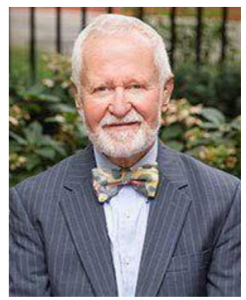



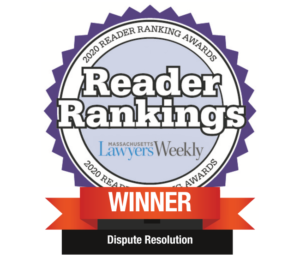

 As published in Massachusetts Lawyers Weekly
As published in Massachusetts Lawyers Weekly

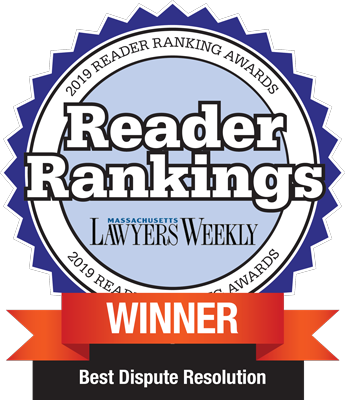




































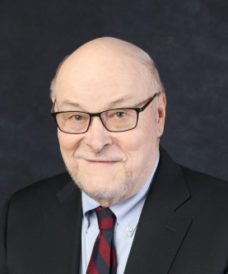

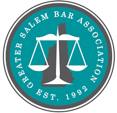





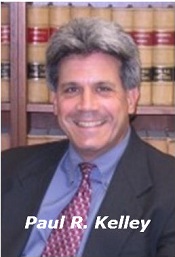

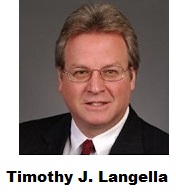












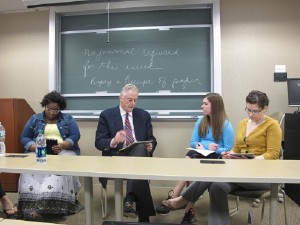
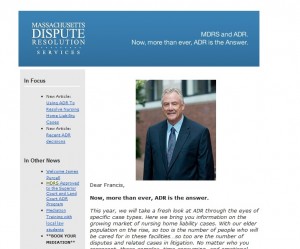


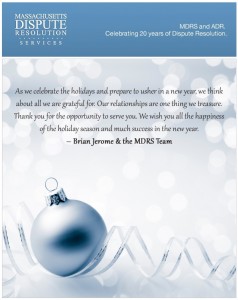
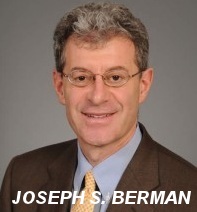
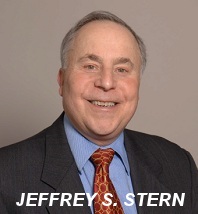

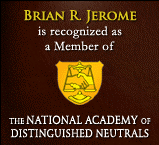










 27 Congress Street, Suite 401, Salem, Massachusetts, 01970
27 Congress Street, Suite 401, Salem, Massachusetts, 01970










 In 1991 Attorney Jerome founded Massachusetts Dispute Resolution Services (MDRS), one of the first full service DR firms in Massachusetts, now with a professional panel of over 30 neutrals, including retired justices and attorneys, that provides out of court mediation and arbitration services to private individuals, attorneys, business and the insurance community.
In 1991 Attorney Jerome founded Massachusetts Dispute Resolution Services (MDRS), one of the first full service DR firms in Massachusetts, now with a professional panel of over 30 neutrals, including retired justices and attorneys, that provides out of court mediation and arbitration services to private individuals, attorneys, business and the insurance community.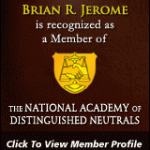






 summarized presentation of a civil trial. A verdict is issued that is non-binding on the parties.
summarized presentation of a civil trial. A verdict is issued that is non-binding on the parties. binding arbitration.
binding arbitration.





